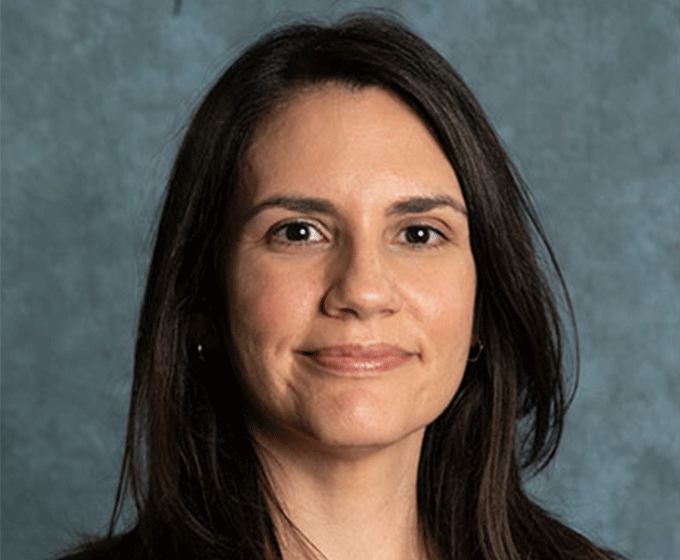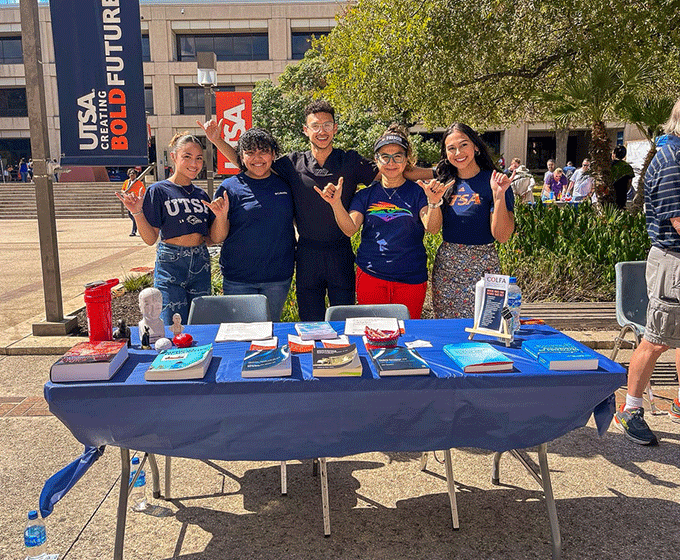
NOVEMBER 2, 2023 — The UTSA College of Liberal and Fine Arts (COLFA) has appointed Cindy Ermus as the new director of its medical humanities program. Ermus is an assistant professor in the Department of History. With nearly 400 currently enrolled students, the UTSA medical humanities program is one of the largest undergraduate degree programs of its kind in the nation.
Medical humanities faculty, under the direction of Ermus, are developing new opportunities for students to actively engage with the local community to help address pressing medical and health-related issues from a humanistic perspective. These will include new internships and experiential learning opportunities as well as study abroad programs.
“One of my first orders of business will be to increase the visibility of the major and to educate the student body about the many benefits of a bachelor’s degree in the medical humanities,” said Ermus. “Just last week, one of our students shared that every time she responds when someone asks her what her major is, their reaction is, ‘Oh, I’ve never heard of medical humanities.’ I want to help change that, starting right here at UTSA. All in all, this is a very exciting time for the Medical Humanities program and I am eager to help lead it into the future.”
 The Medical Humanities program at UTSA.
The Medical Humanities program at UTSA.In an effort to expand the reach of the program, Ermus plans on partnering with the Medical Humanities Club at UTSA to plan more student events, talks and socials. She also has plans to help develop a three-day Global Health Symposium in 2024 where the college will invite some of the foremost experts in public health to speak to students. The symposium will also feature the work of medical humanities faculty and students.
The degree has three concentrations: a pre-medicine degree that meets the requirements of American medical and dental schools, a health careers degree that prepares graduates for a wide variety of health-related careers, and a pre-advanced practice provider concentration that prepares students to advanced degrees in medicine such as nurse practitioners.
"Cindy Ermus is an outstanding choice to lead our Medical Humanities program. Her unwavering commitment to interdisciplinary excellence and her extensive expertise in the fields of public health history, the history of medicine and environmental humanities makes her the ideal candidate to shape the future of this program and prepare our students for impactful careers as health professionals in San Antonio, South Texas and the world,” said COLFA Dean Glenn Martinez.
Ermus is the co-founder and co-executive editor to the digital open-source publication Age of Revolutions.
“My work places the history of medicine and public health, especially disease epidemics, in social and cultural contexts, so I make sure to keep up with the relevant literature in the history of medicine, medical/health humanities, life sciences and other related fields,” shared Ermus.
The Bachelor of Arts in medical humanities offers a unique education that stands at the intersection of medicine, health care and the humanities and encompasses fields such as history, literature, philosophy, ethics and the arts. The degree cultivates a holistic view of health care, moving beyond the scientific dimensions, to deeply understand the emotional, social, cultural and ethical facets of medicine.
By engaging with narratives, literature and art, students enhance their communication abilities and develop a heightened sense of empathy, a critical skill for any health care professional.
“A student could go on to be a medical scribe, a patient care coordinator, a health care recruiter, a medical or pharmaceutical sales representative, a medical writer or editor. They could go on to work for nonprofits. There really are so many possibilities,” noted Ermus. “The key is that the soft skills you gain from a humanities program like critical thinking, effective communication, ethical reasoning and understanding diverse perspectives are highly valued in many professions, even if they aren’t directly related to medicine.”
Upon completing this program, UTSA graduates will emerge with a comprehensive grasp of medical history, emphasizing the significance of the physician-patient relationship, and highlighting the essential role of strong social skills in health care.
They also acquire the ability to analyze human factors influencing health and illness, including topics such as aging biology, the psychology of well-being, the societal context of pharmaceutical usage, health care systems, medical sociology and various related subjects. The program’s first cohort of graduates earned their degrees in 2019.
In 2023, COLFA launched the Interdisciplinary School for Engagement (the E-school), which houses the medical humanities program and others such as Latin American Studies and Museum Studies.
UTSA Today is produced by University Communications and Marketing, the official news source of The University of Texas at San Antonio. Send your feedback to news@utsa.edu. Keep up-to-date on UTSA news by visiting UTSA Today. Connect with UTSA online at Facebook, Twitter, Youtube and Instagram.
Move In To COLFA is strongly recommended for new students in COLFA. It gives you the chance to learn about the Student Success Center, campus resources and meet new friends!
Academic Classroom: Lecture Hall (MH 2.01.10,) McKinney Humanities BldgWe invite you to join us for Birds Up! Downtown, an exciting welcome back event designed to connect students with the different departments at the Downtown Campus. Students will have the opportunity to learn about some of the departments on campus, gain access to different resources, and collect some giveaways!
Bill Miller PlazaJoin us for an intimate evening of cocktails, conversation, and culinary inspiration with Pati Jinich, Emmy-nominated chef and James Beard Award-winning author. Enjoy light bites and signature drinks in the warm, modern setting of Mezquite as Pati connects with guests over her passion for Mexican cuisine and storytelling.
Mezquite Restaurant in Pullman Market, 221 Newell Ave., San Antonio 78215From inspired courses to thoughtful pairings and a rich sense of community, the Ven a Comer Signature Dinner is a night of shared meals, shared stories, and unforgettable flavor.
Stable Hall (Pear Brewery), 307 Pearl Pkwy, San Antonio 78215Come and celebrate this year's homecoming at the Downtown Campus with food, games, giveaways, music, and more. We look forward to seeing your Roadrunner Spirit!
Bill Miller PlazaThe University of Texas at San Antonio is dedicated to the advancement of knowledge through research and discovery, teaching and learning, community engagement and public service. As an institution of access and excellence, UTSA embraces multicultural traditions and serves as a center for intellectual and creative resources as well as a catalyst for socioeconomic development and the commercialization of intellectual property - for Texas, the nation and the world.
To be a premier public research university, providing access to educational excellence and preparing citizen leaders for the global environment.
We encourage an environment of dialogue and discovery, where integrity, excellence, respect, collaboration and innovation are fostered.